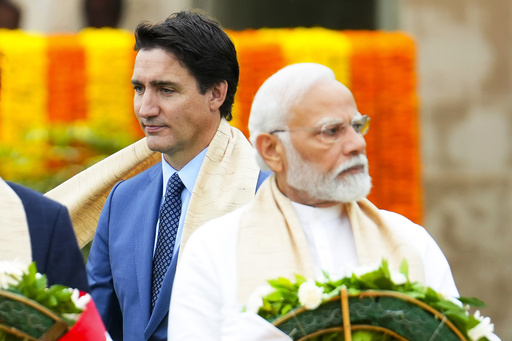
NEW DELHI — A significant diplomatic crisis has erupted between India and Canada, leading to the expulsion of each country’s top diplomats. Tensions have been escalating for over a year, primarily due to the assassination of Sikh activist Hardeep Singh Nijjar in Canada and various allegations related to criminal activities.
Analysts suggest that this diplomatic rift will impede both nations’ potential cooperation and may hinder India’s aspirations to establish itself as an emerging global player. Praveen Donthi, a senior analyst with the International Crisis Group, noted that the already declining bilateral relations between the two countries will face further challenges, suggesting it might take a long time for reconstruction.
The expulsion events unfolded after Canada announced that India’s top diplomat was considered a person of interest in Nijjar’s 2023 murder. The Canadian police reported finding substantial evidence of escalating actions against Canadian citizens alleged to be orchestrated by Indian government agents. Canadian Foreign Minister Mélanie Joly indicated that the evidence links five additional expelled Indian officials to the assassination and emphasized that there exists “ample, clear and concrete evidence” identifying six individuals connected to the case.
In response, the Indian Foreign Ministry branded these allegations as nonsensical and moved to expel Canada’s acting high commissioner and five other diplomats. Concerns regarding Sikh separatist movements have long strained India’s relations with Canada, a country where approximately 2% of the population identifies as Sikh. India’s government has increasingly criticized Prime Minister Justin Trudeau’s administration for allegedly allowing Sikh separatists to operate freely.
Nijjar, who was recognized as a local Khalistan movement leader—an organization India has banned—was already labeled a terrorist by India in 2020 and was wanted for alleged involvement in an attack on a Hindu priest in India at the time of his assassination. India’s recent statement attributed Canada’s claims to a “political agenda” tied to Trudeau’s government, especially with national elections approaching next year.
Analyst Michael Kugelman from the Wilson Center observed that India’s vigorous response is often tied to how openly Canada has aired its accusations. He underscored India’s acute sensitivity to outside criticism regarding its policies, especially when such serious allegations are publicly made by a foreign government. Last year, in reaction to similar allegations from Trudeau, India requested that Canada reduce its diplomatic presence, resulting in the removal of 41 out of 62 Canadian diplomats stationed in India.
Kugelman characterized the current relationship as being on “life support,” with concerns over the Khalistan movement in Canada holding the bilateral relationship hostage. India’s relations with Canada have become increasingly contentious, as it is not the only nation that has accused Indian officials of plotting activities beyond its borders.
Last year, U.S. prosecutors alleged that an Indian official was involved in a failed assassination plot of another Sikh leader in New York. Although the individual remained unnamed, they were described as a “senior field officer” involved in security and intelligence operations, which raised alarms for India at the time. Following the current events, the U.S. State Department indicated that an Indian inquiry committee would meet in Washington as part of an ongoing investigation into the plot against Nijjar.
Canada’s Foreign Minister highlighted India’s willingness to engage with U.S. officials while emphasizing its reluctance to cooperate with the Canadian investigation. Donthi pointed out that India’s aggressive diplomatic actions towards Canada stem from a lower level of stakes involved compared to its more significant relations with the United States.
This strong stance from India serves both as a reaction to external pressures and a show of assertiveness to bolster Prime Minister Narendra Modi’s standing domestically. Any form of public criticism challenges the Indian government’s narrative, and this aggressive posturing seeks to send a signal to both international and domestic audiences.
However, the ongoing diplomatic tension poses risks for Modi’s aspirations of positioning India as a rising global force, especially as he forges closer ties with the U.S., who, like India, remains wary of China’s increasing assertiveness. Donthi predicted that the deteriorating relations would affect the strategic dynamics between the U.S. and Western democracies in their efforts to align with New Delhi as a counterbalance to Beijing.
As Donthi phrase it, the charges stemming from Canada clash with the favorable environment India had enjoyed on the international stage, marking a potential setback for India’s ambitions to establish itself firmly as a global power.
